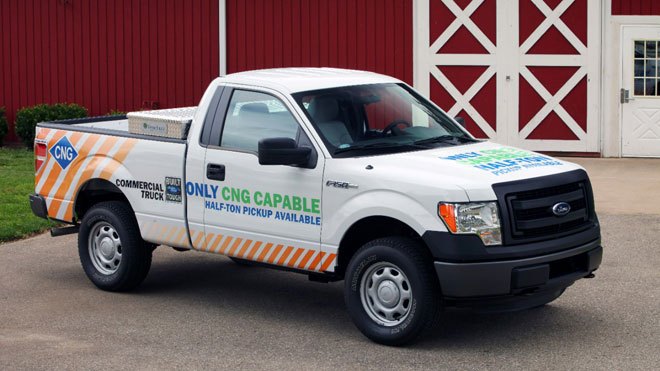Ford F-150 Now Available With CNG/LPG Prep Package, Most Ford Trucks Now Cooking With Gas
Starting with the 2014 model year, for the first time Ford will be offering F-150 buyers the option of running on compressed natural gas or liquid propane gas in addition to gasoline. Automotive News reports that interested can spec a F-150 with the 3.7 liter V6 engine, and then receive a factory-installed CNG/LPG prep package that includes hardened valves, valve seats, pistons and rings. The actual conversions would be done by six CNG/LPG conversion companies that have been certified by Ford as “qualified vehicle modifiers”. As long as the conversion is done by one of those six firms, Ford will honor all factory warranties on the engine. Depending on the size of the fuel tank that’s installed, the cost of the conversions will be between $8,000 and $11,000 a vehicle, but running on gas can be significantly cheaper than running on gasoline or diesel, and the cost of the conversion can be more than paid back over the life of the vehicle.
A gallon of CNG is currently averaging $2.06 in the U.S. Ford projects that it will sell 25% more CNG/LPG prepared vehicles this year than last, more than 15,000 trucks. Since the F-150 pickup is Ford’s biggest selling vehicle in general, 2014 will likely see a significant increase as well. Ford now offers nearly all of its commercial vehicles with the CNG/LPG prep package, including the Transit Connect, the upcoming Transit full size vans, E-series ‘Econoline’ vans, F-series Super Duty trucks & chassis cabs in both F-350 and F-550 sizes, the F-650 medium duty truck and now the F-150.
More by TTAC Staff


































Comments
Join the conversation
CNG burns pretty readily if anything happens to the container. I don't know if it's any worse than gasoline chemically/physically speaking. I heard that gasoline's flash point is actually at about room temperature, if mixed with the air just right. The problem seems to be that the contents under pressure spray all over. Here's a couple of videos from an accident 2 days ago, where you can see explosions of CNG (especially in the 2nd video): 1) https://www.youtube.com/watch?v=SVoI3hB4IiM 2) https://www.youtube.com/watch?v=PlXsxi20ymc At least I think it's CNG. Could be LPG.
So what would be the effect if you got this option and still ran petrol? would the engine last any longer or take any more abuse?
Your CNG fleet vehicle needs to get its payout pretty damn quick before energy markets adjust. When you look at the big picture, running a light motor vehicle with an internal combustion engine on compressed methane offers a pretty skinny economic window. It is inherently expensive and marginal, at best. 1. there is no place to refuel except at home base every night 2. compressing methane is difficult; it gets you distressingly close to absolute zero. Right now, in the USA, crude oil is selling for about $15 USD per mmbtu. Methane sells for around $5 USD per mmbtu. This 3 to 1 price ratio has not existed since the 1930's when Texas methane was a waste product with no market except to make carbon black. The cause of all this is 'fracking', a technological revolution that drove US methane prices from close to $15 USD per mmbtu (where they remain, temporarily, in the rest of the world) down to $5 USD. 'Fracking' also works for oil as well which is putting further downward pressure on oil prices. Once energy markets finish their adjustment, the most likely outcome is that world oil prices (meaning gasoline prices also) will drop quite a bit, and US methane prices will rise. You can't count on the current 3 to 1 spread to last very long. Imo, OPEC will act within a year. The economic prospects of an LNG conversion are a bit harder to figure since the demand for ethane, butane, propane, et. al. in the USA depends on the Gulf Coast petrochemical industry. Still, higher US natural gas prices and lower world oil prices would certainly squeeze the savings from any such conversion.
Don't the tanks have to be replaced every ten years? That would make a ten year old vehicle worth only its scrap value - it wouldn't be worth replacing the tanks.